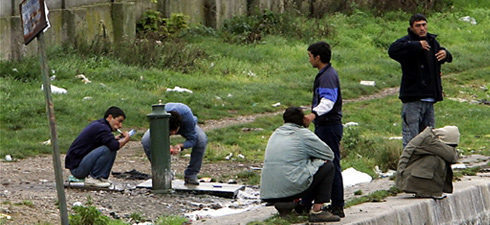Standing in the waist-deep water, with his head and torso covered in soap, he accepted to be photographed with a laugh. The man, an Afghan, was bathing in lukewarm discharge from the Tioxide chemicals plant, in Calais. It was Friday afternoon, close to the wood where some of the town's 1,000 homeless migrants are camping in the hope of obtaining asylum in the UK, or sneaking across the channel inside (or underneath) one of the trucks on their way to Dover.
It has been over six months since overworked staff at the local branch of the Caritas charity suspended access to showers — and staying clean became yet another challenge for migrants, who already had to cope with police harassment, armed traffickers and living like wild animals in the woods.
"The Afghans wash near the plant, and the Eritreans go down to the harbour," explains Céline Dallery, a nurse at a special homeless treatment unit at Calais hospital. The unit offers free medical care, but it only has one shower. Currently over 40 patients queue up daily to wash and look after their skin complaints. The lack of showers has prompted a public health problem: migrants living in the woods contract scabies, which spreads because it cannot be treated without proper washing facilities. “The epidemic has caused the number of visitors to the treatment unit to jump from 15 to 40 per afternoon. Usually, it shouldn't be hard to treat scabies: they just need to wash and change their clothes, and take a few antibiotics."
Recently, a doctor writing in the local daily, Nord Littoral, compared migrants' living conditions to those endured by WWI troops in the trenches. Hours spent dealing with scabies take away from time that ought to be devoted to any number of more serious complaints like TB, diabetes, and fractured bones. The local prefect insisted that the town hall install a hand pump at the entrance to the biggest forest camp or “jangal,” as the Afghan Pashtun migrants call it. Throughout the day, residents of the camp carrying bottles and buckets come and go between the pump and what they ironically call "the bathrooms," an area of improvised cubicles built from wooden factory palettes and blue ground sheets, hung between the poplar trees. When it is time to wash, they heat water over a wood fire in a soot encrusted zinc basin, and pour it over their bodies with empty food tins. The area around the cubicles is littered with disposable razors, and empty shampoo bottles and cans. “When you wash in a place like this, the next day you're dirty again," complains Ahmad from Afghanistan. "Then your whole body gets sick.”
UK opinion
UNHCR intervention a humiliation for EU
The United Nations High Commissioner for Refugees (UNHCR) is establishing a full-time presence in Calais, reports the Independent. The agency's staff will help migrants, refugees and asylum-seekers negotiate the French and British immigration systems. Around 1,600 refugees and migrants are camped outside Calais, a fifth of them children, living in squalid conditions “with no proper provision of even basic facilities.” According to Médecins Sans Frontières, the majority arrive from troubled countries such as Afghanistan, Somalia or Palestine. The UNHCR describes relations between the refugees and the people of Calais as "tense”, with local blaming Britain for “not doing enough to discourage asylum seekers.”
On the other side of Channel, The Daily Telegraph, not without a note of pride, observes that migrants go to Calais because “they want to come to Britain”. For the conservative daily, however, the UNHCR intervention is “a sad reflection on France's unwillingness to deal with the problem” and a humiliation for the EU. The problem will only be resolved, argues the Telegraph, “if the EU's external borders are made water-tight. Such a solution, it laments, seems “beyond the wit of the EU to deliver.” Thousands of people seeking a better life will continue to live “in squalor around Calais, with the UN now trying to pick up the pieces.”
Was this article useful? If so we are delighted!
It is freely available because we believe that the right to free and independent information is essential for democracy. But this right is not guaranteed forever, and independence comes at a cost. We need your support in order to continue publishing independent, multilingual news for all Europeans.
Discover our subscription offers and their exclusive benefits and become a member of our community now!












